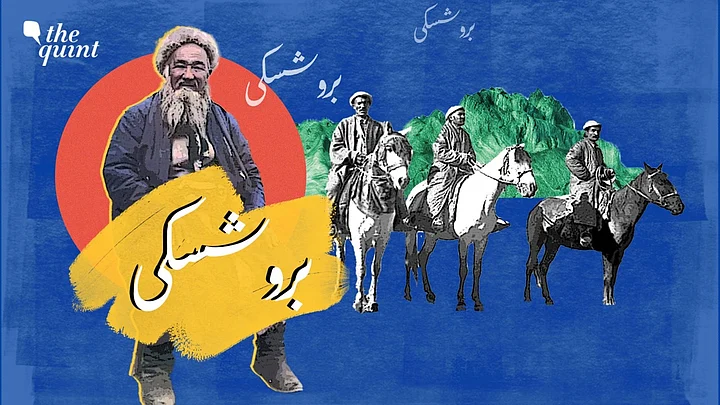Nestled within the Kathi Darwaza neighbourhood of Srinagar’s old city lies the Botraj colony—home to a community of around three hundred “Burusho” people. Originally hailing from the major belts of Hunza, Nagar, and Yasin in Gilgit Baltistan, the community has settled down in Old Srinagar for over a century.
The Burusho people speak a language distinct from the majority community in Kashmir, and many linguists consider the Burushaski language isolate. Raja Mehboob Ali Khan traces the community’s origins to the northern states of Hunza, Nagar, and Yasin now in Gilgit-Baltistan.
“We belong to the regime of Raja Rehan Ali Shah. When the Britishers were colonising the whole world, they wanted to occupy Hunza too so they made a plan and deceitfully sent Raja Rehan Ali Shah to Kashmir after that Dogra ruler who was ruling Kashmir at that time forcibly stopped Rehan Ali here and made him stay as well."
The community then settled In Old Srinagar and became residents, and over the years, their story has become part of their unique cultural heritage.
Oral Tradition of Kashmir’s Indigenous Community
"Dogra rulers provided some kanals of land in many places across Kashmir to live and cultivate crops." Some members of our community live in Batamalo, Bemina, Tral, Dooru Sebdan, Garend, Srinagar, etc.
Our ancestors who migrated to Kashmir were both brothers, so we used to marry across our community but with time it changed and now we marry outside our community as well, we belong to the Shia sect of Islam," says Mehboob Ali Khan.
“Despite being in Kashmir, we still talk in the Burushaski language. We never left it behind, our children at least know four to five languages now."
Cultural differences between Kashmiris and Burusho community aside, Raja Mehboob expresses love for Kashmiri culture, stating that the Burusho community can relate to it. However, he acknowledges that it has not done much to protect their language.
He went onto add, “Over other languages, we always gave preference to Burusho, in our homes, you can see we speak Burusho only which our children have seen us communicating in. So with time, they automatically learned the language. We don’t have books or scripts of this language available here but we have orally taught our children about it."
Community Spirit & High Heritage Value of Burusho's Language
The Burusho people have a strong sense of community and place great importance on social organisation and family relationships. They have a hierarchical social structure, with the extended family being the basic unit of society. The eldest male member of the family is typically the head of the household and has significant authority and responsibility.
Ayman Zehra, Mehboob Ali Khan's granddaughter and a member of the community, emphasises the importance of preserving their language as a means of preserving their identity.
Speaking to The Quint, she said, “Kashmiri people have forgotten their language, but we want to preserve our identity. That’s why our family gives preference to speaking in Burushaski only. While my grandfather knows Balti, Burushaski, Persian, Urdu, and Kashmiri, the youngest member of our family, Mohammad kiyaan knows Persian, Urdu, and English."
Despite facing many challenges over the years, including political upheaval and economic difficulties, the Burusho community has managed to preserve its unique cultural heritage. The community has also made efforts to protect and promote its language.
Age No Bar When It Comes to Bearing the Cultural Mantle
Pertinently, the Burushos in Kashmir are descendants of two former kings of the erstwhile princely states of Hunza and Nagar, who migrated to Kashmir in 1888 after their forefathers were persecuted by the British. While the community faces challenges in preserving its language and traditions, its unique heritage and story continue to fascinate and intrigue generations.
Being a member of the Burusho community, Mohammad kiyaan was also exposed to his mother tongue Burushaski which is not widely spoken in the region. The family takes great pride in preserving their cultural identity and language, and they ensure that Mohammad Kiyaan learns and understands Burushaski as well.
Raja Mahboob Ali Khan sees the younger generation as the key to preserving the community’s traditions and language. “The new generation is our hope,” he says. “We must encourage them to speak and learn Burushaski so that our cultural identity is not lost.”
The family hopes that Mohammad kiyaan and other young members of the community will continue to uphold their traditions and preserve the unique cultural heritage of the Burusho people in Kashmir.
The Burusho community’s story is one of resilience and determination in the face of adversity. Despite being a small and relatively unknown community, they have managed to maintain their unique cultural identity and continue to interest scholars and outsiders alike.
(Sadaf Shabir and Fahim Mattoo are both Journalists based in Kashmir. They have contributed to leading national news organisations. They tweet at @Sadfiiii and @fahimmattoo. This is an opinion piece and the views expressed above are the author’s own. The Quint neither endorses nor is responsible for the same.)
